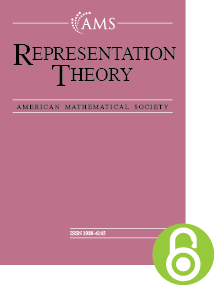Generic extensions and multiplicative bases of quantum groups at ${{\mathbf q=0}}$
HTML articles powered by AMS MathViewer
- by Markus Reineke
- Represent. Theory 5 (2001), 147-163
- DOI: https://doi.org/10.1090/S1088-4165-01-00111-X
- Published electronically: June 12, 2001
- PDF | Request permission
Abstract:
We show that the operation of taking generic extensions provides the set of isomorphism classes of representations of a quiver of Dynkin type with a monoid structure. Its monoid ring is isomorphic to the specialization at $q=0$ of Ringel’s Hall algebra. This provides the latter algebra with a multiplicatively closed basis. Using a crystal-type basis for a two-parameter quantum group, this multiplicative basis is related to Lusztig’s canonical basis.References
- Klaus Bongartz, On degenerations and extensions of finite-dimensional modules, Adv. Math. 121 (1996), no. 2, 245–287. MR 1402728, DOI 10.1006/aima.1996.0053
- Klaus Bongartz, Some geometric aspects of representation theory, Algebras and modules, I (Trondheim, 1996) CMS Conf. Proc., vol. 23, Amer. Math. Soc., Providence, RI, 1998, pp. 1–27. MR 1648601
- Jens Carsten Jantzen, Lectures on quantum groups, Graduate Studies in Mathematics, vol. 6, American Mathematical Society, Providence, RI, 1996. MR 1359532, DOI 10.1090/gsm/006
- Daniel Krob and Jean-Yves Thibon, Noncommutative symmetric functions. V. A degenerate version of $U_q(\textrm {gl}_N)$, Internat. J. Algebra Comput. 9 (1999), no. 3-4, 405–430. Dedicated to the memory of Marcel-Paul Schützenberger. MR 1723475, DOI 10.1142/S0218196799000254
- G. Lusztig, Canonical bases arising from quantized enveloping algebras, J. Amer. Math. Soc. 3 (1990), no. 2, 447–498. MR 1035415, DOI 10.1090/S0894-0347-1990-1035415-6
- George Lusztig, Cells in affine Weyl groups. II, J. Algebra 109 (1987), no. 2, 536–548. MR 902967, DOI 10.1016/0021-8693(87)90154-2
- Markus Reineke, On the coloured graph structure of Lusztig’s canonical basis, Math. Ann. 307 (1997), no. 4, 705–723. MR 1464139, DOI 10.1007/s002080050058
- Christine Riedtmann, Lie algebras generated by indecomposables, J. Algebra 170 (1994), no. 2, 526–546. MR 1302854, DOI 10.1006/jabr.1994.1351
- Christine Riedtmann, Lie algebras generated by indecomposables, J. Algebra 170 (1994), no. 2, 526–546. MR 1302854, DOI 10.1006/jabr.1994.1351
- Claus Michael Ringel, Hall algebras and quantum groups, Invent. Math. 101 (1990), no. 3, 583–591. MR 1062796, DOI 10.1007/BF01231516
- Mitsuhiro Takeuchi, A two-parameter quantization of $\textrm {GL}(n)$ (summary), Proc. Japan Acad. Ser. A Math. Sci. 66 (1990), no. 5, 112–114. MR 1065785, DOI 10.3792/pjaa.66.112
Bibliographic Information
- Markus Reineke
- Affiliation: BUGH Wuppertal, Gaußstr. 20, D-42097 Wuppertal, Germany
- MR Author ID: 622884
- Email: reineke@math.uni-wuppertal.de
- Received by editor(s): August 14, 2000
- Received by editor(s) in revised form: April 10, 2001
- Published electronically: June 12, 2001
- © Copyright 2001 American Mathematical Society
- Journal: Represent. Theory 5 (2001), 147-163
- MSC (2000): Primary 17B37; Secondary 16G30
- DOI: https://doi.org/10.1090/S1088-4165-01-00111-X
- MathSciNet review: 1835003


